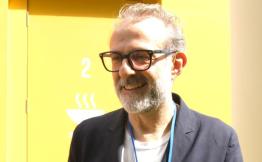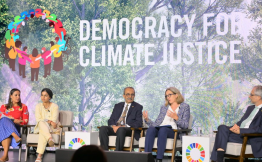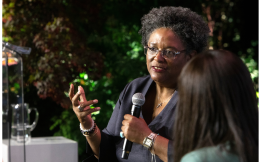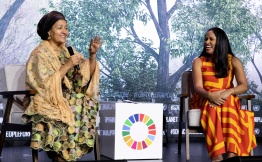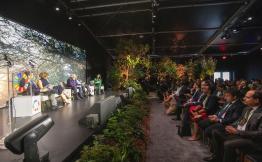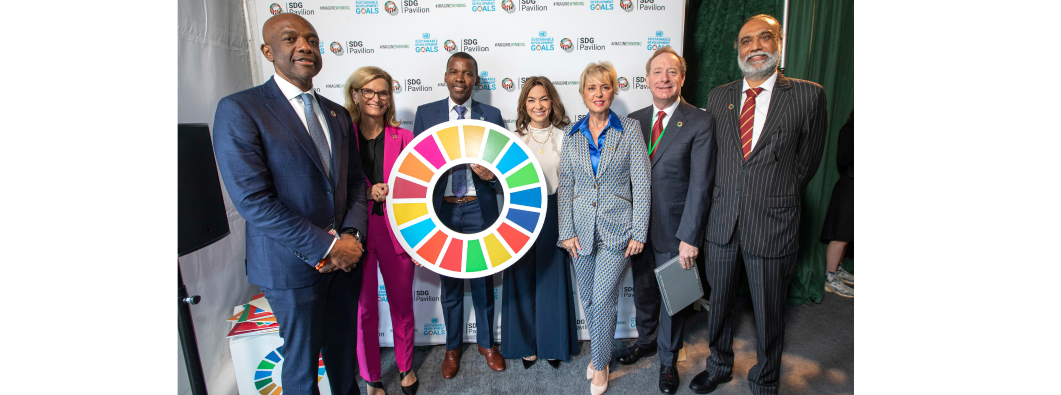
Artificial Intelligence: Safeguards and solutions
Artificial Intelligence (AI) is a powerful tool with the potential to help tackle complex problems quickly and at scale. However, AI also poses considerable risks, including mis- and disinformation, inherent biases, affecting everything from job markets to democratic values.
This event, on Tuesday morning 19 September 2023, gathered technology innovators and investors, high-level government officials, civil society , and experts from the United Nations to discuss the opportunities and the safeguards needed at the halfway point of the Goals and a new wave for AI.
Amandeep Gill Singh, the UN Secretary-General's Special Envoy on Technology, insisted that digital technologies need to be scaled with ambition and responsibility. “Artificial Intelligence is destined to play a big role in the next seven years as we countdown to 2030."
Borhan Yassin the CEO of Rainforest Connection, an organization which fights illegal deforestation, demonstrated an AI audio tool, which can help combat the devastation of the rainforest. "When you are in the middle of the rainforest and you are hearing all these species that are vocalizing, it's very hard to decipher even a chainsaw that is metres away. With AI, we are able to decipher specific sounds, down to individual type of species, and we are also able to detect any illegal activities. That is important, because, every year, 12 million acres of rainforest are destroyed, threatening over a million species with extinction".
Mr. Yassin’s talk was followed by a discussion, moderated by Emily Chang, Bloomberg Host and Executive Producer, with Dr. Lemogang Kwape, Minister of Foreign Affairs of Botswana, and Amandeep Gill Singh, UN Secretary-General’s Special Envoy on Technology.
The conversation covered the importance of appropriate governance in ensuring a fair and equal protection of basic rights, wellbeing, and livelihoods. Mr. Kwape said that his country is making the space and funding available for young people – 60 per cent of the population – to develop AI technologies.
Responding to the pervasive fears surrounding AI, the Minister explained that bad actors, rather than the technology, are the problem. “There’s nothing wrong with AI, and everything wrong with us, that’s why we need regulations. But we must not impede creativity because, by being creative, we can solve a lot problems. Regulation is good, because we are bad! But we must not over-regulate.”
The third part of the session was a panel, moderated by Ms. Chang, on keeping the right balance between AI regulation and innovation.
"AI is not yet another technology,” warned Carme Artigas Brugal, Secretary of State for Digitalisation and AI in Spain, underlining the need for good regulation in the sector. “For the first time ever, we have a technology that can evolve without human agency and we are now questioning ourselves and what make us unique”.
The UN’s contribution to the evolution of AI was highlighted by Doreen Bogdan-Martin, Secretary-General of the International Telecommunication Union (ITU). “We need to be sharing practices and experiences,” she said. “What the UN has to offer, , is this ability to convene.”
Brad Smith, the Vice Chair and President of Microsoft, called for joined up thinking in the sector; “If we are to advance AI, we have to advance all the technologies together. We have to close the connectivity gap, close the AI gap, and close the electricity gap.”
This sentiment was echoed by James Manyika, Senior Vice President, Technology and Society at Google. “We want regulations that minimize and mitigate everything that we are concerned about but, at the same time, we want regulations that enable the positive things that we want to happen. The fact that some places, some people, some societies, and some countries run the risk of being left out is problematic.”
AI has the potential to improve basic preventive health care, according to Dr.Geetha Manjunath, Founder and CEO of NIRAMAI Health Analytix. Ms. Majunath expressed her hope that AI can bridge the healthcare divide that exists between the "haves" and the "have nots", the developed and developing countries, and rural and urban environments.
The technology could be instrumental in scaling equality and inclusion. The final panel, moderated by futurist Sinead Bovell, explored AI as a tool for inclusion. Speakers also discussed strategies for ensuring equal representation in data to minimize biased algorithms.
Cina Lawson, Minister of Digital Economy and Transformation of Togo, said that connectivity is a priority for her country. “What we want to do right now to digitize our countries is to deploy fibre. We also want to build data sources, in terms of education and health, then apply algorithms that we can use to improve our policies."
Unequal levels of financial inclusion could be addressed by AI, according to Ms. Shamina Singh, Founder & President of the Mastercard Center for Inclusive Growth. But, she added, “You have to build structures to be inclusive by design, secure by design and with privacy at their heart".
UN Secretary-General’s SDG Advocate Valentina Muñoz Rabanal, pointed out that youth have to play a central role in the development of technology. She argued that, whilst children and young people are getting more representation, as core users, they need to be seen as protagonists.
"AI can be a gamechanger for 1.3 billion persons with disabilities,” noted Mr. Gopal Mitra, Global Lead on Disability and Development at the UN Children’s Fund (UNICEF) “Imagine AI captioning. For you it's a convenience, for a person with a hearing-impairment it's life-changing."
The closing part of the session was an exclusive sit-down with 2021 Nobel Peace Prize laureate Maria Ressa. AI technology, she said, has to be understood by all parts of society, including sociologists and behavioural scientists, and developed in a principled environment where money isn't the driving force. “We have seen that, when money is the driving force, the harms are pushed aside and, unless they touch advertising revenue, they won't be addressed."
Watch the session [HERE]
See more photos [HERE]




